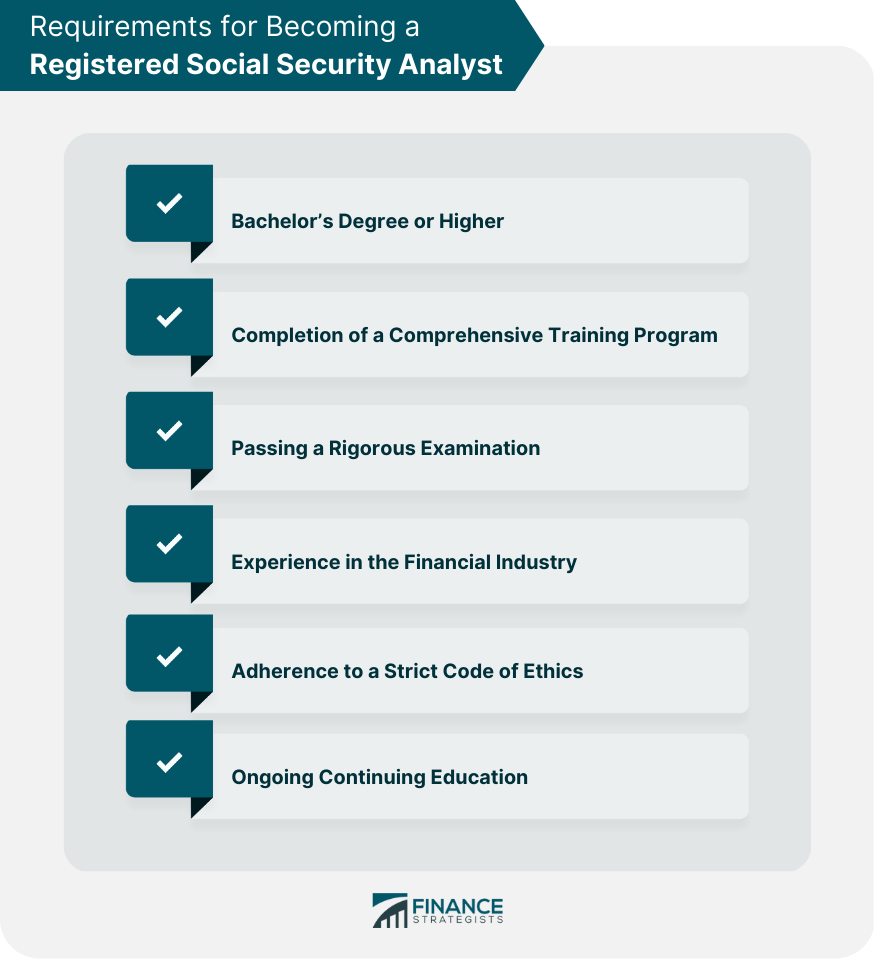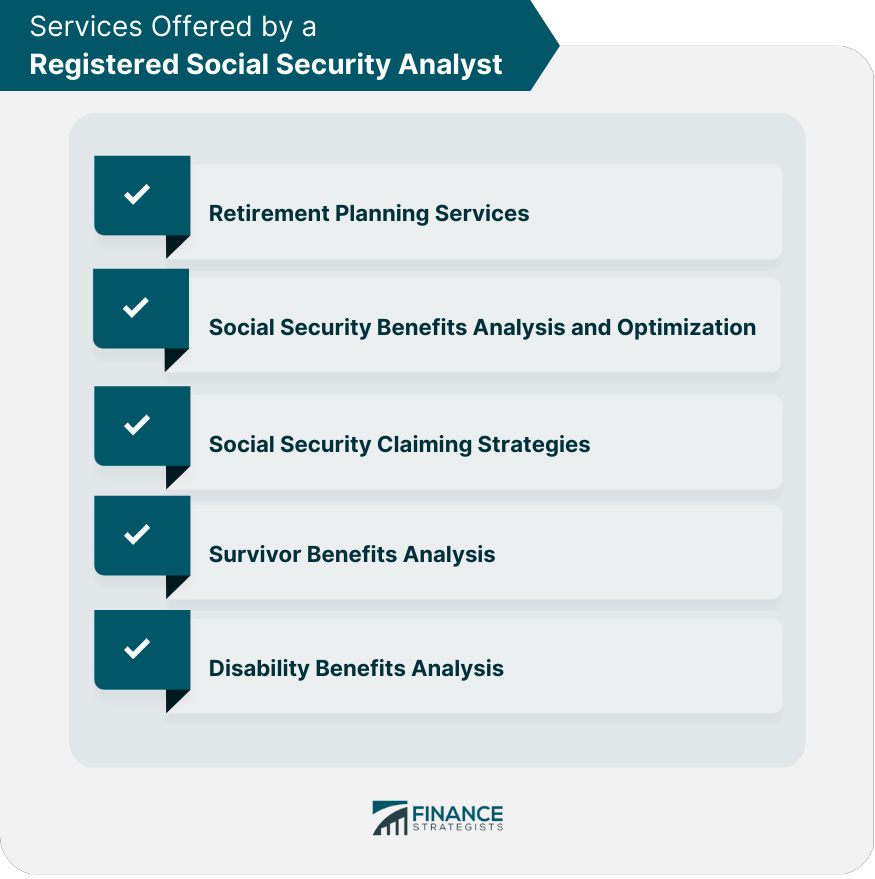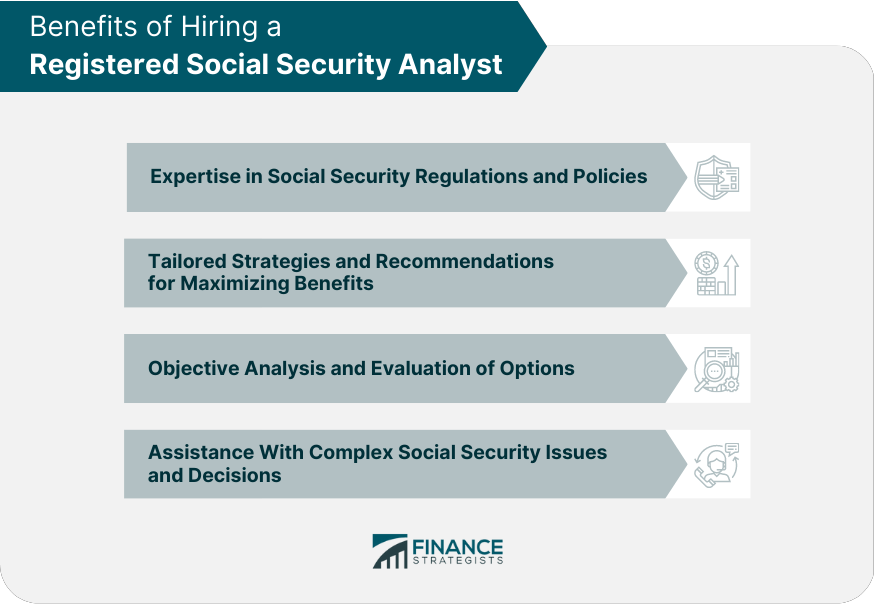A Registered Social Security Analyst (RSSA) is a professional who specializes in analyzing the Social Security system, including its rules, regulations, and policies, and helps clients to understand their benefits and develop strategies for maximizing them. Registered Social Security Analysts are Social Security experts who have undergone rigorous training and have met specific requirements to become registered. The primary purpose of an RSSA is to help clients understand their Social Security benefits and develop personalized strategies to maximize them. They analyze a client's Social Security record, assess their eligibility for various benefits, and help them navigate the complex system to get the benefits they are entitled to. This includes helping clients understand the rules and regulations governing Social Security, such as when to claim benefits, how to maximize their benefits, and how to coordinate their benefits with other retirement income sources. Becoming a Registered Social Security Analyst requires a combination of the following requirements: Candidates must have a bachelor's degree or higher from an accredited college or university. While a specific major is not required, degrees in finance, accounting, economics, or a related field are preferred. They must complete a comprehensive training program on Social Security that covers topics such as Social Security regulations, claiming strategies, survivor benefits, and disability benefits. The training program must be approved by the National Association of Registered Social Security Analysts. Candidates must pass a rigorous examination that tests their knowledge of Social Security regulations, policies, and strategies. The examination is administered by the NSSA or a similar professional organization and is typically offered online. Aspiring candidates must have at least some years of experience in the financial industry, with a focus on retirement planning and Social Security analysis. Registered Social Security Analysts must adhere to a strict code of ethics that governs their professional conduct. The code of ethics includes standards for integrity, objectivity, confidentiality, professionalism, and competency. RSSAs must complete ongoing continuing education requirements to maintain their registration. This includes completing a minimum number of continuing education hours every year to stay up-to-date on the latest Social Security regulations, policies, and strategies. Registered Social Security Analysts offer a wide range of services to help clients maximize their Social Security benefits. Some of the services they provide include: A Registered Social Security Analyst can help clients develop a comprehensive retirement plan that includes Social Security benefits. They can help clients understand their projected retirement income, develop a retirement budget, and identify strategies for optimizing their Social Security benefits. This involves analyzing a client's Social Security record to determine their eligibility for various benefits and identifying strategies to maximize those benefits. This particular service includes analyzing factors such as claiming age, spousal benefits, and survivor benefits to identify the best claiming strategy for each client. RSSAs can assist clients navigate the system to maximize their benefits. They make clients understand the rules and regulations governing Social Security and develop a personalized claiming strategy that takes into account their unique circumstances. Working with a Registered Social Security Analyst allows clients to understand the survivor benefits available to them and develop strategies to maximize those benefits. This includes analyzing factors such as the age and health of the surviving spouse and coordinating survivor benefits with other retirement income sources. Disability benefits analysis involves analyzing a client's eligibility for disability benefits. The analyst can help clients understand the rules and regulations governing disability benefits and develop a plan to navigate the system and get the benefits they are entitled to. There are many benefits to hiring a Registered Social Security Analyst to help with Social Security planning and analysis. Registered Social Security Analysts enable clients to understand the nuances of Social Security benefits, such as when to claim benefits, how to coordinate their benefits with other retirement income sources, and how to optimize their benefits over their lifetime. Another benefit of hiring a Registered Social Security Analyst is that they provide tailored strategies and recommendations for maximizing benefits. They take into account a client's unique circumstances, such as their age, marital status, health, and financial situation, to develop personalized strategies for optimizing their Social Security benefits. This allows clients to achieve their retirement goals and ensure they have the income they need to maintain their lifestyle in retirement. They have a fiduciary responsibility to act in their client's best interest and provide unbiased recommendations that are tailored to their unique circumstances. This ensures that clients receive objective advice that is based on their specific needs and goals, rather than on a one-size-fits-all approach. Finally, hiring a Registered Social Security Analyst provides assistance with complex Social Security issues and decisions. A Registered Social Security Analyst guides clients in understanding their benefits, answers questions, and provides guidance on the best course of action. They can also provide ongoing support and advice as clients' circumstances change over time. After knowing the requirements and benefits of hiring a Registered Social Security Analyst, it is important to know where and how to find one. Online directories and databases are one option, as they provide a list of Social Security Analysts in a specific area. Referrals from financial advisors or other professionals can also be helpful, as they can provide recommendations based on their own experiences with Social Security Analysts. Finally, professional organizations and certifying bodies, such as the NARSSA, can provide a list of Registered Social Security Analysts who meet specific requirements and adhere to a code of ethics. A Registered Social Security Analyst is a valuable resource for individuals and organizations seeking Social Security analysis and planning services. They have extensive knowledge of Social Security regulations and policies and can help clients navigate the complex system to maximize their benefits. Registered Social Security Analysts provide tailored strategies and recommendations, objective analysis and evaluation of options, and assistance with complex Social Security issues and decisions. To find a qualified professional, individuals can use online directories, seek referrals from financial advisors or other professionals, or consult professional organizations and certifying bodies. Working with a financial advisor can help integrate Social Security planning into a broader financial plan that addresses all aspects of retirement. Therefore, it is important to consider working with a financial advisor in addition to a Registered Social Security Analyst to achieve a well-rounded retirement plan.What Is a Registered Social Security Analyst (RSSA)?
Requirements for Becoming a Registered Social Security Analyst
Bachelor’s Degree or Higher
Completion of a Comprehensive Training Program
Passing a Rigorous Examination
Experience in the Financial Industry
Adherence to a Strict Code of Ethics
Ongoing Continuing Education

Services Offered by a Registered Social Security Analyst
Retirement Planning Services
Social Security Benefits Analysis and Optimization
Social Security Claiming Strategies
Survivor Benefits Analysis
Disability Benefits Analysis

Benefits of Hiring a Registered Social Security Analyst
Expertise in Social Security Regulations and Policies
Tailored Strategies and Recommendations for Maximizing Benefits
Objective Analysis and Evaluation of Options
Assistance With Complex Social Security Issues and Decisions

How to Find a Registered Social Security Analyst
Online Directories and Databases
Referrals From Financial Advisors or Other Professionals
Professional Organizations and Certifying Bodies
Bottom Line
Registered Social Security Analyst (RSSA) FAQs
A Registered Social Security Analyst is a financial professional who specializes in Social Security analysis and planning. They have completed a comprehensive training program, passed a rigorous examination, and adhere to a strict code of ethics.
Registered Social Security Analysts offer a range of services, including retirement planning, Social Security benefits analysis and optimization, Social Security claiming strategies, survivor benefits analysis, and disability benefits analysis.
The benefits of hiring a Registered Social Security Analyst include expertise in Social Security regulations and policies, tailored strategies and recommendations for maximizing benefits, objective analysis and evaluation of options, and assistance with complex Social Security issues and decisions.
You can find a Registered Social Security Analyst through online directories and databases, referrals from financial advisors or other professionals, and professional organizations and certifying bodies.
While a Registered Social Security Analyst can provide valuable services for Social Security analysis and planning, it is important to consider working with a financial advisor to achieve a well-rounded retirement plan that addresses all aspects of retirement.
True Tamplin is a published author, public speaker, CEO of UpDigital, and founder of Finance Strategists.
True is a Certified Educator in Personal Finance (CEPF®), author of The Handy Financial Ratios Guide, a member of the Society for Advancing Business Editing and Writing, contributes to his financial education site, Finance Strategists, and has spoken to various financial communities such as the CFA Institute, as well as university students like his Alma mater, Biola University, where he received a bachelor of science in business and data analytics.
To learn more about True, visit his personal website or view his author profiles on Amazon, Nasdaq and Forbes.











